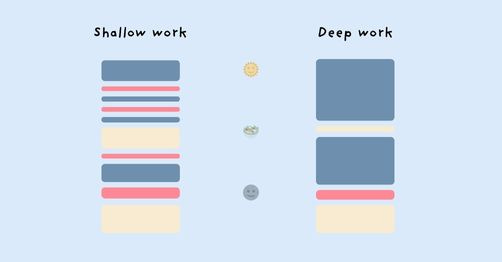Setting a timer for tasks will change your life.
But there is a right way and a wrong way to do it.
Let me show you how.
Most people go about their day without setting a time for their important tasks.
We think about timing when it comes to appointments.
There’s usually a fixed time you’re expected to show up.
And it’s the same with deadlines.
How well you keep time matters with your appointments and deadlines.
It’s a good thing if you’re early—in fact it’s often said “the earlier the better”.
And it’s a bad thing if you’re late.
But for some reason we don’t do this for tasks.
Parkinson’s Law basically says:
“Work expands to fill the time allotted for it’s completion.”
If you have 4 hours to complete a task that’s how long you’re probably going to take—if you complete it.
I say “if” because more often than not we don’t even finish a task in the time available.
But does this mean you can finish tasks earlier if you allocate a shorter window?
The way we work
You need long stretches of uninterrupted work to produce impactful and meaningful results—a concept known as Deep Work.
But the modern work day is inundated with distractions and interruptions.
Notifications.
Email.
Social media.
Shallow work.
Think of any high-value task or skill—like coding, prospecting, surgery—and then imagine trying to produce acceptable results with constant interruptions.
Yet this is how the vast majority of us approach work.
But if our goals were worthwhile why would we want to spend our hours doing mediocre work?
This is why some people achieve so much more than you do and they do it faster than you assume possible…
Yet we all have the same number of hours each day.
The first step towards producing high-value results is to enforce long and uninterrupted hours for work.
But it’s not enough to simply put a block in your calendar and say it’s for deep work.
After you’ve fixed a decent amount of time for your important tasks the next thing to do is time your work hours.
The wrong way to work
Most people who work on their goals (or any work for that matter) look at the tasks for the day and start working until their time runs out.
They carry over unfinished tasks into the next day.
Or they work extra hours to “get more done”.
Parkinson’s Law in action.
This is a huge cause of stress for a lot of people who are trying to achieve goals.
You just can’t seem to make progress.
Even if you’re working harder than everyone else.
It’s time to work smart.
A better way to work
A lot of people try to overcome this by timing their work.
One of the most popular methods is the Pomodoro Technique.
This is a time management method using intervals of work with short breaks in between.
For example:
Work uninterrupted for 25 minutes
Take a 5 minute break
This is a useful way to get more work done in the allotted time because it breaks up your working hours into manageable chunks.
You can also stay more focused and reduce stress by stretching or getting fresh air during the short breaks.
I recommend starting with the Pomodoro Technique.
You can use a clock on your desk or use a desktop app like pomofocus.io.
Don’t use your phone.
Too many distractions.
The Pomodoro Technique works great and I’ve used it for years.
But does it address the problem highlighted in Parkinson’s Law?
The best way to work
Keep reading with a 7-day free trial
Subscribe to Strategic Sunnah to keep reading this post and get 7 days of free access to the full post archives.




